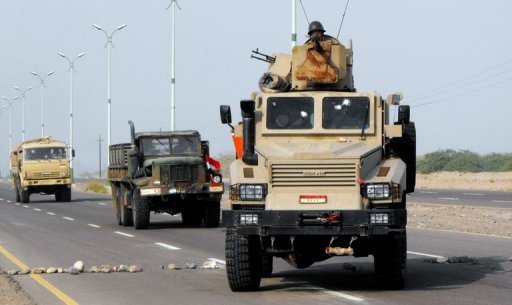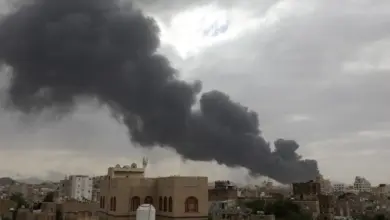
SANAA — FBI director Robert Mueller and Yemen's new president pledged to step up the fight against Al-Qaeda Tuesday only hours after government forces fought their way to the heart of a southern Yemeni city that has been held by Islamic extremists for nearly a year.
Yemeni officials also said a senior Al-Qaeda in Yemen commander who had been convicted in a 2002 attack on a French oil tanker but later escaped from prison was killed in an airstrike over the weekend in a remote area in northeast Yemen.
Mueller held a 45 minute meeting with Abed Rabo Mansour Hadi in the capital Sanaa during which they discussed the battle against Al-Qaeda, particularly in the southern Abyan province, and political support for the new leader, according to a presidential spokesman.
The spokesman, Yahya al-Arasi, said Hadi stressed to Mueller the importance of U.S support for the campaign against Al-Qaeda. The FBI is the U.S. government's main domestic law enforcement agency, but it has liaison offices in countries around the world.
Yemeni forces entered the center of Abyan's provincial capital of Zinjibar after a fierce, six-hour battle that ended early Tuesday.
Militants from Al-Qaeda's Yemeni branch seized Zinjibar last May, taking advantage of the internal political turmoil in the impoverished nation to capture several areas in the lawless south.
The Yemeni Embassy in Washington said Mohammed Said al-Umdah, who went by the alias Ghareeb al-Taizi and provided logistical and financial support for the terror network, was killed Sunday when an airstrike hit an SUV in which he was traveling.
Al-Umdah had received military training under the late Al-Qaeda leader Osama bin Laden's supervision in Afghanistan and was among a number of convicts who escaped from a Yemeni prison in February 2006, the embassy said in a statement.
The statement did not specify who carried out the strike, but U.S. drones have frequently targeted suspected Al-Qaeda militants in the country.
Hadi's predecessor, Ali Abdullah Saleh, was a key ally in the U.S. fight against terror before he was ousted following a popular uprising against his autocratic rule. But the battle was sidelined during months of political insecurity.
The new leadership has vowed to make it a priority again, and stepped up the offensive against the militants in the south after a military shake-up that replaced Saleh loyalists with new officials.
The United States, which has provided millions of dollars for equipment and training to improve the capabilities of the Yemeni forces, says Al-Qaeda's Yemen branch is the terror network's most dangerous.
Al-Qaeda in the Arabian Peninsula, the formal name of the terror network's branch in Yemen, has been linked to several attempted attacks on U.S. targets, including the foiled Christmas Day 2009 bombing of an airliner over Detroit and explosives-laden parcels intercepted aboard cargo flights last year.
Unlike other Al-Qaeda branches, the network's militants in Yemen broke away from the concept of sleeper cells and actively sought to gain a territorial foothold in lawless areas in the south, close to strategic shipping lanes in the Arabian and Red seas as well as proximity to militants in the Horn of Africa across the Red Sea.
Control, or at least a presence, in that part of Yemen would place the militants within striking distance of tankers carrying vital oil supplies to the West.
Already, the militants have struck at Western interests in the area twice in the past 12 years. In 2000, they bombed the USS Cole destroyer in Aden harbor, killing 17 sailors. Two years later, they struck a French oil tanker, also off Yemen.
In a separate development Tuesday, Saleh's half-brother, air force commander Mohammed Saleh al-Ahmar, formally gave up his command and left his office at the military section of the international airport at Sanaa. Al-Ahmar had rejected Hadi's decision to replace him and refused to leave.
Al-Ahmar's dismissal from his longtime command of the air force was part of Hadi's shake-up of the armed forces, weeding out Saleh loyalists and relatives from key posts.
The U.S. ambassador to Yemen, Gerald Feierstein, said over the weekend that the shake-up has helped the fight against Al-Qaeda.



